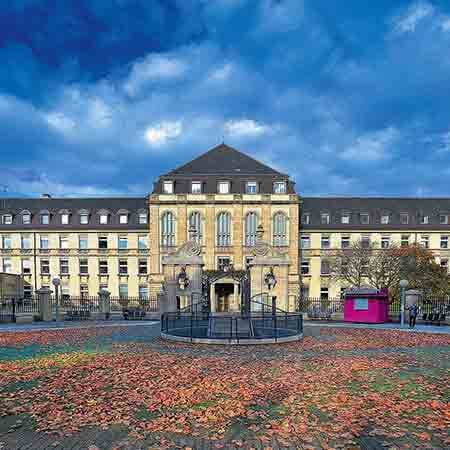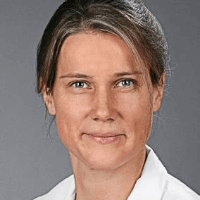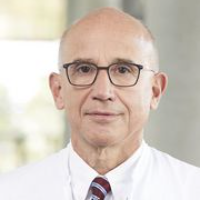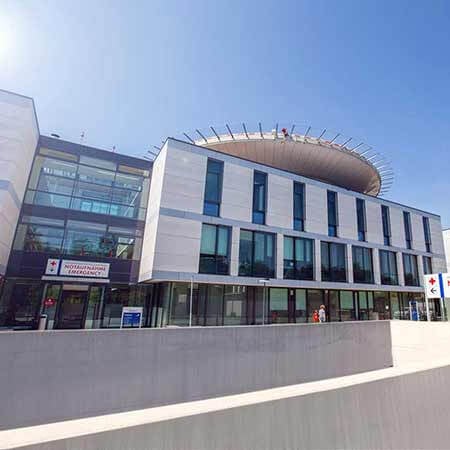Acute Lymphoblastic Leukemia (all) — Consolidation treatment in the Best Hospitals in the World
Treatment prices are regulated by national law of the corresponding countries, but can also include additional hospital coefficients. In order to receive the individual cost calculation, please send us the request and medical records.

Department of Hematology and Oncology
The Department of Hematology and Oncology offers the full range of services in these medical fields. It diagnoses and treats all benign and malignant blood diseases, cancers. The huge clinical experience and high competence of the doctors working in the department allow them to achieve excellent treatment results even in the most severe cases.


Department of Hematology, Oncology, Rheumatology, Infectology and Bone Marrow Transplantation
The Department of Hematology, Oncology, Rheumatology, Infectology and Bone Marrow Transplantation offers modern diagnostics and treatment in all areas of its specialization. The medical facility treats patients with solid malignant tumors of various locations, malignant and benign diseases of the hematopoietic system, rheumatic diseases, and infections. The department enjoys a reputation as one of the leading health facilities for bone marrow transplants in Germany, which is confirmed by accreditation in accordance with JACIE standards. More than 80 allogeneic and more than 100 autologous bone marrow transplants are performed in the medical facility annually. In addition, the department successfully carries out innovative CAR T-cell therapy, which is available only in the most advanced medical centers worldwide. The department is part of the Comprehensive Cancer Center Ulm (CCCU), where a multidisciplinary team of highly professional doctors takes care of the health of patients. The high quality of medical services is confirmed by the certification of the German Cancer Society (DKG). The health of patients is in the safe hands of experienced specialists who strive to provide each patient with the most effective treatment using advanced therapeutic methods. The medical facility has 112 beds and many specialized outpatient clinics.







Department of Hematology and Oncology
The Department of Hematology and Oncology offers the full range of diagnostics and treatment of blood diseases, coagulation disorders, oncological diseases and related pathological conditions. The treatment is provided both on an outpatient and inpatient basis. The patient is offered a comprehensive treatment, including intensive care to eliminate side effects associated with the tumor and therapy, development of individual recommendations on nutrition, physiotherapeutic measures and psycho-oncological care.

Acute lymphoblastic leukemia is one of the most dangerous oncohematological diseases. To undergo treatment of this pathology, the patients often go abroad. The occurrence of this disease in children is one and a half times more often than in adults. A child usually has a more favorable course of the disease and can more often be completely cured.
What is consolidation?
The treatment of acute lymphoblastic leukemia has the following several stages:
- Induction.
- Consolidation.
- Maintenance therapy.
Initially, the child is prescribed intensive chemotherapy. This is required for the achievement of remission. According to the protocol, the complete remission is the reduction of the number of blast cells to less than 5% according to bone marrow test. The induction usually lasts 3-4 weeks. In a month, 95% of young patients achieve a remission.
After this, the child receives a less intensive, but prolonged treatment. It is called consolidation. The goal of this therapy is to prevent a relapse.
Treatment methods
The doctors apply at least one, and sometimes two, chemotherapy options. The second one is only required if the cancer spreads to the central nervous system.
- Systemic chemotherapy involves the intravenous injection of drugs and their oral intake. They affect the whole body. This is the basis of treatment.
- Intrathecal chemotherapy involves the administration of drugs into the spinal canal. This is required in order to overcome the blood-brain barrier. With such an administration method, medicines penetrate directly into the cerebrospinal fluid, reaching the spinal cord and brain.
Here are some features of chemotherapy in some categories of patients:
- in high-risk lymphoblastic leukemia, doses of drugs increase;
- in an insufficient response to chemotherapy, delayed intensification is used (a short course with high doses of drugs, as at the induction stage);
- in case of ineffective chemotherapy, the protocol provides for stem cell transplantation or the use of immunotherapy.
Additional treatments:
- Brain irradiation. The doctors try to avoid this option, but if the tumor develops in the brain, they have to perform this procedure. Adults do not usually have significant side effects, although they may develop neurological symptoms. The child has a risk of mental retardation.
- Targeted therapy. It can be effective only in Philadelphia chromosome leukemia.
- Stem cell transplantation. The best results can be achieved when using a bone marrow transplant from a donor. It may be a brother or sister who have sufficient tissue compatibility. If the patient does not have native compatible donors, they are searched in the database.
- Immunotherapy. It can be used in the absence of a good response to chemotherapy or in a relapse after stem cell transplantation. The doctors use CAR or monoclonal antibodies.
Side effects
The use of chemotherapy drugs for tumor destruction always causes side effects, but severe consequences at this stage can rarely develop. They are more common for induction. At the consolidation stage, most patients receive lower doses of drugs.
Here are some standard side effects, which may occur in the treatment of any malignant tumors:
- hair loss;
- nausea;
- vomit;
- headache;
- diarrhea or constipation.
At the consolidation stage, the treatment lasts several months. During this time, the doctors use the drugs, which reduce the number of cells in the blood. This occurs due to the inhibition of red bone marrow function. Therefore, the patient should regularly undergo diagnostics. A complete blood count serves to assess the concentration of the formed elements.
The following symptoms may occur:
- frequent infectious diseases due to the decreased production of mature leukocytes;
- nosebleeds, bruises on the skin, bleeding gums due to the reduction of platelets;
- due to the lack of erythrocytes, such symptoms of anemia as pale skin, increased heart rate, fatigue appear.
According to the protocol for the management of such patients, the transfusion of blood and its components is required. This helps to reduce the symptoms.
Results
Consolidation and subsequent maintenance therapy provide good treatment results in most patients. Many people manage to recover from acute lymphoblastic leukemia by means of chemotherapy. Sometimes, success can be achieved with the help of stem cell transplantation.
The children have a better prognosis than adults. It is even better, if the child suffers from B-cell leukemia and he is under the age of 9 years.
The adults do not always achieve remission. It is more complex task and it takes more time. The relapses occur more often. It is possible to cure the patient completely only in 40% of cases. The worst prognosis is the age of the patient after the age of 65 years. They are often not able to undergo intensive chemotherapy course, and therefore the doctors carry out only maintenance therapy. It does not allow to achieve complete remission of the disease, but can only increase the life expectancy of the patient.
Most relapses occur during treatment or during the first year upon its completion. The tests can very rarely show a relapse of the disease after 12-24 months. If the relapse does not occur 2 years later, the treatment of acute leukemia is very likely to be successful. Only in isolated cases, can the pathology recur in such a long period of time.
Treatment abroad with the Booking Health company
You can undergo effective treatment of acute lymphoblastic leukemia abroad according to modern medical care protocols. To do this, you can contact the Booking Health company. We will arrange your trip, reduce the costs for diagnostics and therapy. You will receive the following benefits:
- Selection of the best hospital specializing in the treatment of cancer for the diagnostics and treatment of acute lymphoblastic leukemia abroad.
- Reduced cost of a therapy course or bone marrow transplant surgery due to the lack of additional coefficients and overpricing for foreign patients.
- Booking an appointment for the diagnostics, conservative treatment or surgery on the most suitable dates for you.
- Preparation of the program, taking into account previously performed examinations.
- Establishment of communication directly with the doctor of the Department of Oncology.
- Monitoring of the program at all its stages.
- Control of the costs of all procedures and operations, return of unspent funds.
- Buying and forwarding of medicines.
- Organization of additional cancer diagnostics, surgery or rehabilitation after the main program.
- Communication with the hospital upon the completion of treatment of acute lymphoblastic leukemia.
The patients of foreign clinics who booked the program with the help of the Booking Health service leave positive feedback about our work. After all, we help not only to get rid of the worries about trip organization, but also to reduce the cost of medical services. In the reviews, people respond positively about the quality of treatment in Cancer Clinics abroad. Many people manage to completely recover from a serious disease.
We will provide you with top-class services. We will translate medical documentation, medical history, help you to get a visa, book airline tickets and a hotel room. We will meet you at the airport and take you to the Cancer Center. Once your treatment course is completed, you will be taken back to the airport.

